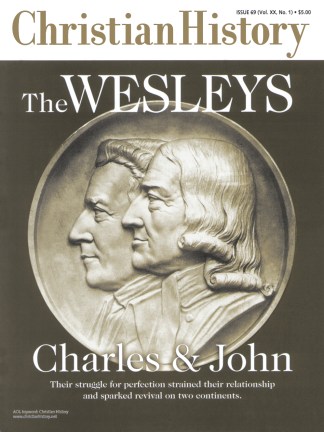After spending just one day in America, John Wesley already had grave concerns about the new colonies. He wrote in his journal on February 19, 1736, “Beware America, be not as England!”
Just over a year earlier, John and Charles Wesley had stood at their father’s bedside as he died. John was asked to accept the Epworth parish, but he declined because he needed the spiritual rigors of the Oxford Holy Club.
Three months later one of the trustees of the Georgia colony challenged John and the Holy Club to go to America and minister to the Indians and colonists.
John worried about leaving his mother, but she spiritedly responded, “Had I twenty sons, I should rejoice that they were all so employed, though I should never see them more.” Instead, only two sons boarded the America-bound Simmonds, and she saw them both again within two years.
On February 4, 1736, the Simmonds came within view of the shoreline of Georgia. John read in his Bible, “A great door and effectual is opened,” and he added this prayer, “Oh let no one shut it!”
Although the Wesleys came to Georgia to preach to the Indians, they soon discovered that the leaders of the colony needed them for other duties. Charles became personal secretary to the colony’s governor, Colonel James Oglethorpe, and John served as parish minister to the colonists in Savannah.
Almost immediately, Oglethorpe turned against Charles. The colonel forced Charles to sleep on the floor of a hut, and when this arrangement made him desperately ill, Oglethorpe denied his request for a bed. Bewildered, Charles finally discovered that two women had been spreading vicious rumors about him.
Oglethorpe apologized for his behavior and reinstated Charles’s privileges, but Charles remained unwell and discouraged. Soon afterward, the colonel ordered Charles to return to England and put down reports that Georgia was in shambles. Charles was only too happy to go.
In the meantime, John had fallen in love with one of his Savannah parishioners, Sophy Hopkey (see “The Matchmakers“). For various reasons, however, he couldn’t bring himself to propose to her, and finally she gave up on him and became engaged to a Mr. Williamson. John thought he would die of grief. He even made out his will.
Following Sophy’s marriage, John threw himself into his work. He tried to be the Williamsons’ pastor, but of course it did not work. Five months later John refused to serve Mrs. Williamson Holy Communion. No doubt jealousy played a role in his decision, though he said he rejected her because he knew of unconfessed sin in her life.
Wrath from all over the colony fell upon John’s head, and the Williamsons sued for defamation of character. The trial dragged on for months, and finally John told his journal, “I saw clearly the hour was come for leaving this place.”
In spite of local ban, he left for England on December 2, 1737, and arrived home two months later. His missionary career was over.
Copyright © 2001 by the author or Christianity Today/Christian History magazine. Click here for reprint information on Christian History.










